Nieman Reports
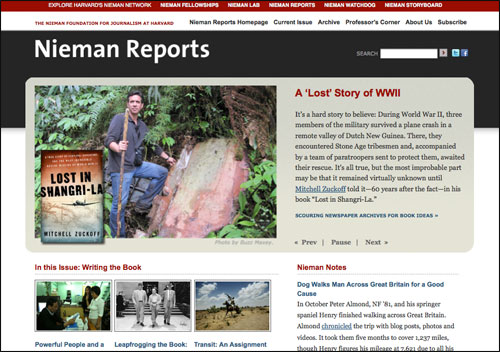
By weaving our global family of Nieman Fellows together,
Nieman Reports has been the Nieman Foundation’s strongest and most enduring thread for 65 years.
In its back pages, Nieman Notes helps community members keep up with fellows’ journeys and achievements while the focus of its featured stories persistently adheres to the foundation’s founding mission to elevate the standards of journalism.
Nieman Reports was born of a need recognized in the
1947 report of the Hutchins Commission that “the press should engage in vigorous mutual criticism.” Today, Nieman Reports continues to do just this in serving a global audience of journalists with our quarterly print magazine and website, which we redesigned earlier this year.
Now on
Niemanreports.org, we spotlight contemporary news about journalism, feature the ongoing work of Nieman Fellows and contributors in the field, provide timely updates through Nieman Notes and offer links to our other endeavors. This fall, we also began sending a weekly e-mail newsletter to members of our digital community to draw attention to our current issue and website content.
Our topics, both in Nieman Reports and on the website, converge with conversations and contemplation about journalism’s present-day challenges and its entrepreneurial experimentation. In this year’s four issues, Nieman Reports has published the following collections of stories:
Winter 2011
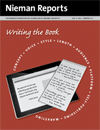 |
Writing the Book explores the intersection of journalists writing books and the rapid changes occurring within the publishing business. Authors offer insights on which ideas, platforms and digital platforms work best for specific types of books. |
Fall 2011
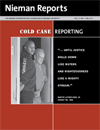 |
Cold Case Reporting illuminated the experiences of reporters digging into cold case documents about racial murders committed during the civil rights era. In other sections, the focus turned to reporting on black America today and the troubles and possibilities of the Arab media in the wake of recent revolutionary struggles. |
Summer 2011
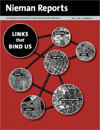 |
Links That Bind Us highlighted the ways that journalists are creating, nurturing and engaging communities in digital space —an effort that is fueled, in part, by their instinct to survive in a crowded media landscape where social networking is a powerful agent for news distribution. |
Spring 2011
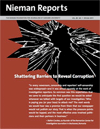 |
Shattering Barriers to Reveal Corruption: With an initial focus on Eastern Europe, where corruption is rampant in both government and business and barriers to reporting on it are numerous, we examined the toll exacted on journalists throughout the world who try to tell stories about corruption in their own backyards. |
This fall, we reprinted the stories from the Spring 2011 edition, “Shattering Barriers to Reveal Corruption” in a
special issue that we published in Kiev, Ukraine, to share with journalists participating in the 7th Global Investigative Journalism Conference there.
In the Classroom
Nieman Reports continues to be a vital teaching tool used by journalism school professors in the United States and abroad. In
Professor’s Corner online, stories we’ve published in the magazine are bundled around topics of interest to students, such as a classroom-friendly series of essays about
The Elements of Journalism and a terrific collection of pieces about
visual journalism and how to teach photojournalism and multimedia skills.
We also publish original contributions from j-school professors —
Hacker Chronicles, for example, describes what it’s been like to bring computer science and journalism students together to develop entrepreneurial news sites through collaborative vision and problem solving.
This fall we heard from Jerome Aumente, NF '68, Distinguished Professor Emeritus at Rutgers University who devotes his time to training journalists overseas. He let us know how he and his Lithuanian students have used Nieman Reports for their training:
| “I have found the special topics you have explored in Nieman Reports invaluable in my teaching and training efforts here in the United States and overseas. Most recently, the month I spent in Lithuania at the University of Vilnius was helped greatly by the multiple issues of Nieman Reports I was able to assign to students during my Fulbright Specialist visit and then leave at its Institute of Journalism library.” |
Opening Our Doors
At the end of October, Nieman Reports hosted a revealing discussion at Lippmann House on “
The Arab Press: Can It Keep up with Political Transformations?” with Rami Khouri, NF ’01 and a Nieman Advisory Board member who has been involved in news media in the Arab world for the past 40 years; Amahl Bishara, assistant professor of anthropology at Tufts University; and Sabah Hamamou, deputy business editor at Al-Ahram newspaper and founder of Masrawyya—Egyptian Media Hub, a start-up website for new media, who wrote for the Fall 2011 issue of Nieman Reports and joined us live from Cairo via Skype.
Video of the live-streamed event and other resources from Nieman Reports are now online.
Through Nieman Reports’s use of social media—Twitter,
Facebook and
Tumblr (where we highlight stories from our archives in “Old Meets New”) —we are expanding our audience far beyond what we reached through our mailing list alone, creating community that reaches not only newsrooms and journalism associations, but classrooms, conferences and other venues where questions that reporters, editors and photographers raise become core topics of discussion.
Melissa Ludtke*
Editor, Nieman Reports
1992 Nieman Fellow
* Melissa recently resigned after completing 13 years as Nieman Reports editor.